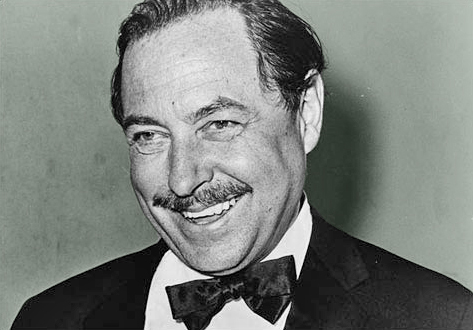
Here, Tennessee Williams writes to his mother, Edwina, from his boarding house in New Orleans. He describes the “Bohemian spirit” of the French Quarter, along with his financial troubles. His time spent in there would serve as his inspiration for both A Streetcar Named Desire and his later, lesser-known work Vieux Carré, a play that did not open until 1977, and had only a five-performance run. In 1939, streetcars ran on the Desire line, which connected Bourbon Street to the French Quarter.
Dear Mother:
It is just as well Grand and Grandfather decided to delay their visit, as we’ve had a very hectic time at 722 Rue Toulouse. As I’ve probably mentioned, the land-lady has had a hard time adjusting herself to the Bohemian spirit of the Vieux Carrre. Things came to a climax this past week when a Jewish society photographer in the first floor studio gave a party and Mrs. Anderson expressed her indignation at their revelry by pouring a bucket of water through her kitchen floor which is directly over the studio and caused a near-riot among the guests. They called the patrol-wagon and Mrs. Anderson was driven to the Third Precinct on charges of Malicious Mischief and disturbing the peace. The following night we went to court—I was compelled to testify as one of the witnesses. Mrs. Anderson said she did not pour the water but I, being under oath, could not perjure myself—the best I could do was say I thought it highly improbable that any lady would do such a thing! The Judge fined her fifteen dollars. One of the other witnesses was the wife of Roark Bradford, who wrote Green Pastures, the famous negro play. Her dress was ruined at the party. I went to see her afterwards to assure her my part in the affair was altogether unwilling—she was very nice and cordial and assured me there were no hard feelings at least toward me. I also met Mr. Bradford and Sam Bird, a New York producer. As all my plays are in New York I had nothing to show him. I’m using my colorful experiences here as the background for a new play which is well under way.
The process of certification for the Writers’ Project will be complete the fifteenth of this month and I expect Mr. Saxon will put me on at once, as he seems very much concerned and sympathetic about my precarious situation. He gave me a list of trade journals yesterday, that I might get temporary writing jobs from. I’m making a round of their offices. One of the radio stations is doing a weekly ghost story and they’re going to produce my spook radio drama which I luckily got back from KXOK. They don’t mention payment but of course it may lead to something—the radio-stations here are in pretty bad shape, in fact everything is except the business which caters directly to the tourists.
I haven’t heard a word from Rita Oberbeck about my Kansas City play. You might phone her that I am out of town and would like to know about it—I don’t know her address but she lives on Euclid.
I hope I will get at least some encouraging news from the New York contest. It should be announced the fifteenth. I already know twice as many people here as I ever knew in St. Louis—some of them highly influential such as the Bradfords and Saxons—so I ought to get a break.
Mrs. Anderson’s unpopularity has wrecked the Eat Shop—I don’t think she can ever re-open it. But Mrs. Nesbit plans to start a new one when she returns from Florida.—Mrs. Anderson plans to sell the place for $350. —lease on the house and out-right sale of their complete furnishings, many of which are valuable antiques. If you come down here, you might be interested.
I’m completely out of funds now—so could use a few dollars if you’re not in the same predicament.
Hope you’re all well and Dakin successful in his scholastic and social enterprises.
With much love,
Tom
From The Selected Letters of Tennessee Williams, Volume 1. Williams, Tennessee, Albert J. Devlin, and Nancy M. Tischler. New York: New Directions Pub., 2000.


